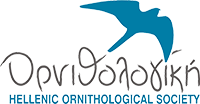A very successful, 3-day seminar for the training of new Lesser White-fronted Goose ‘ambassadors’ in Greece took place from 2 to 4 February 2024 in the Evros Delta.
This was the second seminar organized by the Hellenic Ornithological Society (HOS / BirdLife Greece), in the scope of the LIFE LWfG Climate project. It was hosted and supported by the Evros Delta Management Unit of the Natural Environment and Climate Change Agency Greece (NECCA - ΟΦΥΠΕΚΑ).
Having received an overwhelming number of applications, the HOS team had a tough job choosing the 20 volunteers that would attend the seminar. For the final selection, newly-recruited volunteers residing in parts of Northern Greece were given a priority, while a few spots were reserved for more experienced members of the recently activated Network for the protection of the Lesser White-fronted Goose.
The 1st day of the training coincided with the World Wetlands Day celebrations (2/2) and not by chance, since the Lesser White-fronted Goose is one of the most threatened waterfowl species in Europe. Furthermore, the species’ Fennoscandinavian population, travels every September from the Artic Cycle to winter in the wetlands of Northern Greece.


During the training, the participants learned about the species’ biology and were informed about the critical threats these birds face as well as regarding cross-border actions that are implemented since 2020 for their protection. The volunteers were also trained on how to distinguish the species and monitor its population which our country has a responsibility to protect.
After the training part was concluded, the new “ambassadors” of the Lesser White-fronted Goose enjoyed a field visit to the Evros Delta, one of the most important wetlands of Greece and also had the opportunity to learn and appreciate the avifauna of the neighboring Lakes Vistonida and Ismarida, the latter having been an important area for the species in the past.


Due to the fact that the Lesser White-fronted Geese have not left Lake Kerkini for the Evros Delta thus far this winter, our volunteers did not get the chance to practice their new monitoring skills. Nevertheless, they observed many different raptor species but mainly watefowls, including thousands of Bewick Swans and hundreds of Greater White-fronted Geese as well as five Red-breasted Geese (a species categorized as Vulnerable and a rare visitor for Greece).
More news from our Network for the Protection of the Lesser White-fronted Goose are coming soon, so stay tuned!




